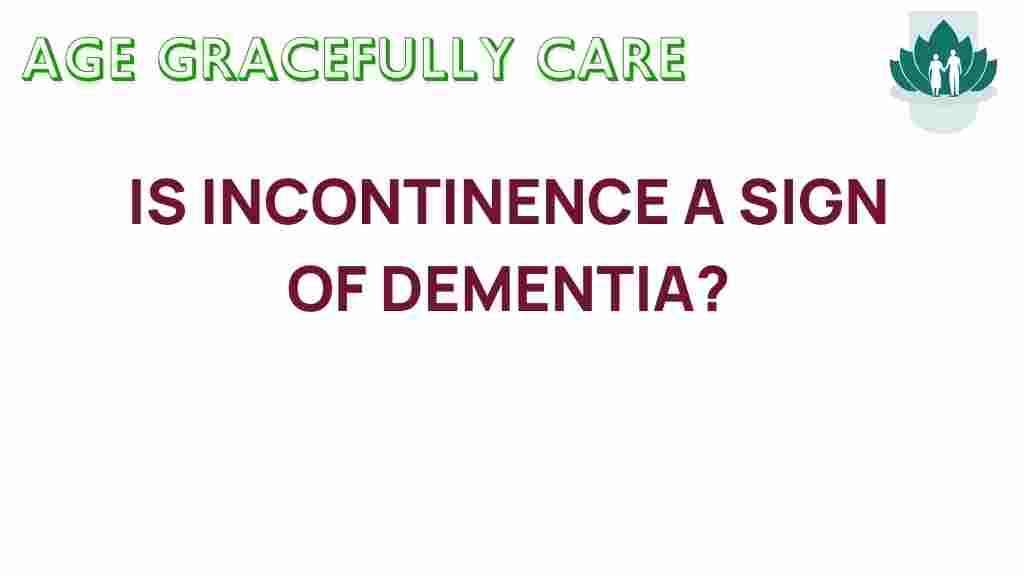Is Incontinence a Hidden Warning Sign of Dementia?
Incontinence, the involuntary loss of bladder or bowel control, is often viewed as a common issue among the elderly. However, recent studies suggest that it may be a hidden warning sign of dementia and other cognitive declines. Understanding the connection between incontinence and dementia is crucial for caregivers and family members of older adults. This article will explore the relationship between these two conditions, how they manifest, and what steps can be taken to manage them effectively.
Understanding Incontinence and Its Types
Incontinence can occur for various reasons, and its types can be categorized as follows:
- Stress Incontinence: This type occurs when physical movement or activity puts pressure on the bladder, leading to involuntary leakage.
- Urge Incontinence: This occurs when a sudden, intense urge to urinate leads to involuntary loss of urine.
- Overflow Incontinence: This happens when the bladder doesn’t empty completely, causing leakage.
- Functional Incontinence: This is due to physical or mental impairments that prevent timely bathroom access.
As people age, the risk of developing incontinence increases, but it should not be dismissed as a normal part of aging. Instead, it can be an indicator of underlying health issues, including dementia.
The Connection Between Incontinence and Dementia
The link between incontinence and dementia can be surprising, but research has shown that cognitive decline can lead to various physical health issues, including urinary incontinence. Here are some critical points to consider:
- Brain Function: The brain controls bladder function, and cognitive decline can impair this control, leading to incontinence.
- Memory Loss: Individuals with dementia may forget to use the bathroom, leading to accidents.
- Motor Skills: Dementia can affect motor skills, making it difficult to reach the bathroom in time.
Recognizing Warning Signs of Dementia
Incontinence is one of several warning signs of dementia. Other symptoms to watch for include:
- Memory loss that disrupts daily life
- Difficulty completing familiar tasks
- Confusion about time or place
- Changes in mood and personality
- Withdrawal from social activities
If you notice a combination of these symptoms, it may be time to seek medical advice. Early diagnosis can lead to better management of both incontinence and dementia.
Step-by-Step Process to Manage Incontinence in the Elderly
Managing incontinence in elderly individuals, especially those showing signs of cognitive decline, requires a compassionate and systematic approach. Here’s a step-by-step guide:
Step 1: Medical Evaluation
Consult a healthcare professional to determine the underlying cause of incontinence. This may involve:
- Physical examinations
- Urinary tests
- Neurological assessments
Step 2: Create a Care Plan
Develop a personalized care plan based on the evaluation. This may include:
- Scheduled bathroom breaks
- Incontinence products like pads or adult diapers
- Pelvic floor exercises to strengthen bladder control
Step 3: Implement Lifestyle Changes
Making certain lifestyle adjustments can help manage incontinence:
- Encouraging fluid intake during the day, limiting it at night
- Avoiding bladder irritants such as caffeine and alcohol
- Maintaining a healthy diet rich in fiber to prevent constipation
Step 4: Regular Monitoring
Keep track of incontinence episodes and any changes in cognitive function. This information is valuable for healthcare providers and can assist in treatment adjustments.
Troubleshooting Tips for Caregivers
Caring for an elderly person with incontinence and potential dementia can be challenging. Here are some troubleshooting tips:
- Patience is Key: Understand that accidents may happen and approach the situation with empathy.
- Maintain Hygiene: Regular cleaning can prevent skin irritation and infections.
- Provide Reassurance: Encourage your loved one and reassure them that they are not alone in this struggle.
- Seek Support: Consider joining caregiver support groups for shared experiences and advice. You can find more resources at Caregiver Action Network.
Conclusion
Incontinence can indeed serve as a hidden warning sign of dementia, especially in the elderly. Recognizing the connection between incontinence and cognitive decline is essential for timely intervention and management. By understanding the various types of incontinence, the symptoms of dementia, and how to create an effective care plan, caregivers can significantly improve the quality of life for their loved ones.
If you notice signs of incontinence, especially alongside other symptoms of cognitive decline, do not hesitate to seek medical advice. Early detection and intervention can lead to better outcomes in managing both incontinence and dementia, ultimately enhancing the overall health and well-being of the patient.
For more information on dementia and its warning signs, visit the Alzheimer’s Association.
This article is in the category Health and created by AgeGracefullyCare Team
